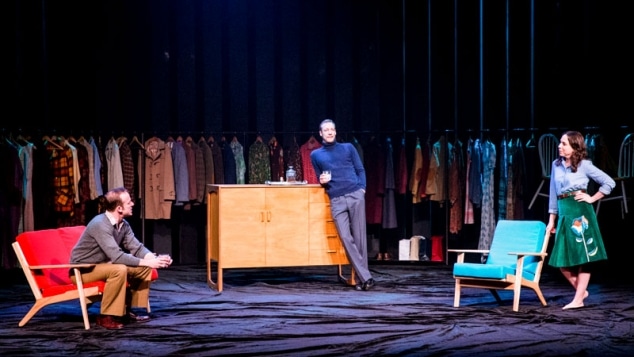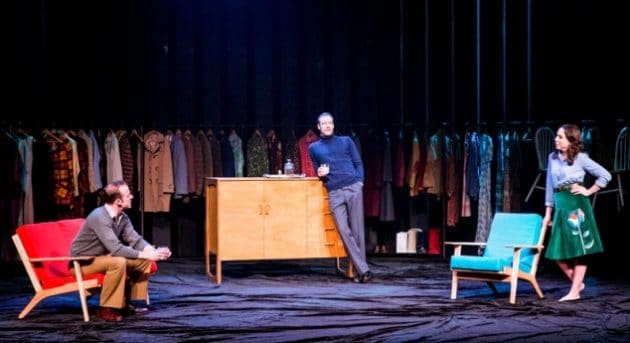MTC: Betrayal
Following seasons in Adelaide and Canberra, Geordie Brookman’s production of Harold Pinter’s 1978 play Betrayal has opened at the MTC. Inspired by the writer’s own relationships, it’s a remarkable exploration of betrayal from the irrelevant to the heartbreaking, and the personal to the professional.

It opens with Emma (Alison Bell) and Jerry (Nathan O’Keefe) meeting at a bar after their extra marital relationship had ended and she reveals that her marriage to Jerry’s best friend Robert (Mark Saturno) is over. Told in reverse chronological order (mostly), it leaves the audience knowing more than the characters do, so instead of asking “what happens next?”, they can ask “why did they behave like that?”. And without the need for exposition, the writer and characters are able to be completely in the moment and free to be silent.
The transfer to the bigger Sumner Theatre results in a loss of the intimacy that magnifies the relationships on the stage (go for the closer seats) – and makes Geoff Cobham’s clothes-rack revolve design feel more contrived than natural – but the power of the held back performances still reaches the back corners.
The gut kick of Betrayal lies in understanding people who never say what they mean and whose need for control and “appearance” is more driving than any real love that might be there. This isn’t a wild romance about heartbreak and selfless love, it’s about the far-easier selfish choices that feel uncomfortably familiar.
As the truth of Pinter’s writing is in the subtext of his in-the-text pauses, it becomes clearer when the performances are pulled back and the emotion lives in the emptiness between the characters.
Brookman’s direction ensures that this empty space is wide and clear. Touch – and the emotion connection it represents – is kept to the ritual of a handshake or an hello kiss, or the necessity of sexual desire. And as each scene answers questions to the one that came before, the cast show the moments that set up new barriers and closed down moments of connection.
O’Keefe’s Jerry starts closed and bitter and becomes more open and relatively innocent as time moves backwards, as Saturno’s Robert starts closed and angry and becomes more trusting and content. But it’s Bell’s Emma who holds the heart of the work.
Bell’s contained performance is staggering in its depth and quiet power. She holds back every emotion and reaction that Emma wants to scream but never will. She lets Emma know her weaknesses and accept that she will betray and be betrayed to keep the appearance of happiness, even if no one is happy.
The adultery in Betrayal is never what really hurts the characters or breaks them apart. It’s the little moments about table clothes or broken down speedboats that build into a silence that lets people choose to betray themselves and everything they’ve worked for and wanted rather than acknowledge every betrayal they’ve faced and committed. If Pinter tells us anything, it’s listen to the moments of silence.




